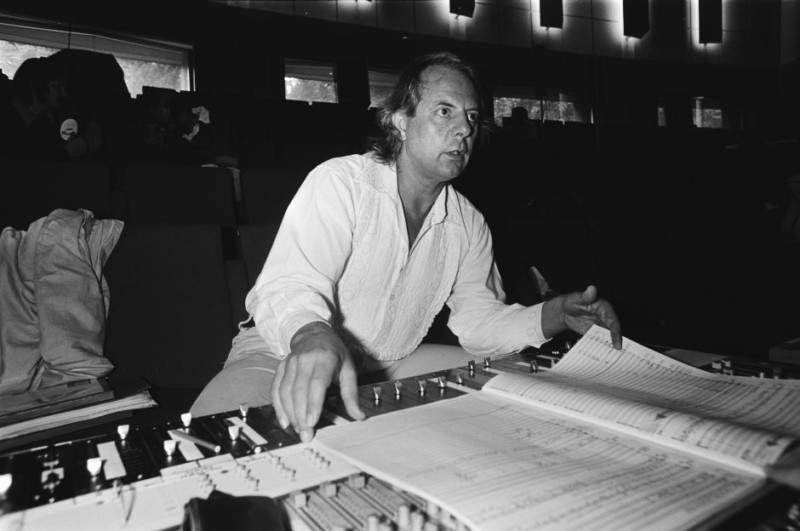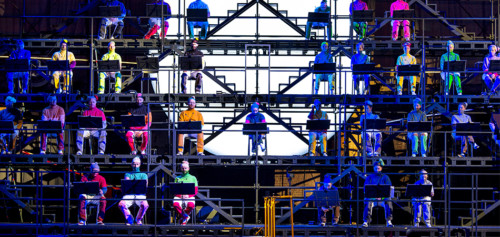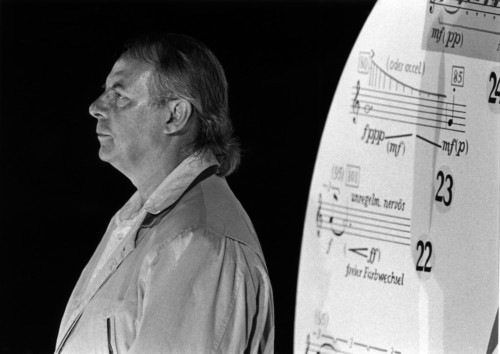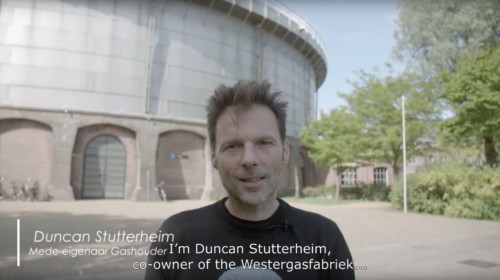Stockhausen in the twentyfirst century

A whole new world opened up when I first heard Stockhausen’s music. It was as if the definition of what music could be had been expanded.’ At a panel discussion at Amsterdam Dance Event, the British producer Darren Cunningham asserted that Karlheinz Stockhausen (1928-2007) was extremely important, if not ‘life changing’, in his musical development. Under the pseudonym Actress, he has been pushing musical boundaries in techno with international success. It was Stockhausen, he says, who showed him the path less travelled. Cunningham is not the only one. Since Stockhausen acquired cult status, beginning in the middle of the previous century, artists from The Beatles to Björk, Brian Eno and Miles Davis have cited him as a source of inspiration. He also became – and still is – of immense significance to fellow composers. As composer Michel van der Aa put it when Stockhausen died: ‘I think he is in the musical residue of every contemporary composer.
Whether you agree with him or not: you always have to take him into account.’ Stockhausen was a tireless innovator, who greatly influenced music history. He was one of the first to compose electronic music, move the music (and sometimes the musicians) through the concert hall so that the sound no longer statically emanated from the stage, and deploy instrumentalists theatrically: not only singers, but also clarinettists or trumpet players could interpret characters. He also developed many new musical forms, tools and methods, including a scale of twelve tempos analogous to the chromatic pitch scale, and ‘intuitive music’ which relies heavily on the musicians’ collective imaginations.
These innovations would have been musicological footnotes if the vast majority of his music had not sounded so convincing and overwhelming, testifying to his flawless ear, masterly control over the resulting sound, and an unmatched sense of sound and structure. From his early, electronic Gesang der Jünglinge or his young masterpiece Gruppen für drei Orchester to the hushed final notes of DONNERSTAG aus LICHT, from the meditative mantras in Stimmung to the full-surround swirling COSMIC PULSES: hearing these pieces once, preferably live, will leave an unforgettable impression on you.
Stockhausen’s ambitions were literally sky high (HELIKOPTER-STREICHQUARTETT), and regularly even more exulted (COSMIC PULSES, Sirius, Sternklang). They are not gimmickry – as is sometimes alleged, especially about the helicopter quartet. Rather, Stockhausen simply followed artistic ideas through to their ultimate consequences. After making full use of the musical possibilities of the space in a concert hall in early compositions, the ultimate next step would be to get the music to actually take to the air. It also makes dramaturgical sense as a scene in the opera MITTWOCH, in which air is the central element, a debate about love has already been held atop a skyscraper, and auditions for a heavenly orchestra take place high in the air.
This unbridled imagination and ambition, suffused with the need to think big and when necessary beyond all bounds give Stockhausen’s oeuvre a sublime quality. Consequently, it is not surprising that it puts off or even repels some people. Neither is it difficult for sceptics to find aspects of Stockhausen’s work and life to ridicule. For instance, LICHT’s idiosyncratic theology, his flirtation with the controversial spiritual book Urantia, and the autobiographical myth about his birth on the star Sirius. This is overshadowed by his impolitic comment – taken out of context by journalists eager for a scoop – on the 9/11 attacks, which Stockhausen said demonstrated that Lucifer, the representative of evil, still exists. Yet this is the same oeuvre with the same limitlessness that continues to fascinate, inspire, and enchant musicians and listeners as well as artists to this day.
At the upcoming festival several composers are working on the implications of Stockhausen’s work. Colin Benders is working on a larger scale than ever, departing from the simple stereo of electronic dance music, with a spatially arranged ‘electro-symphonic orchestra’. Michel van der Aa, like Stockhausen, often composes the theatrical aspects of his music. He aims to use virtual reality to achieve a spatial experience of music theatre in Eight. Actress is presenting a twenty-first century counterpart to Stockhausen’s WELT-PARLAMENT, in which he is breaking new ground by using artificial intelligence to generate music. Using the latest electronic resources in their music is self-evident to all three composers. How different things were when Stockhausen made his first electronic compositions.
The ultimate Stockhausen experience is the three-day marathon performance aus LICHT, composed of scenes from Stockhausen’s magnum opus – the seven-part opera cycle LICHT. Many music students in The Hague are following a special LICHT master’s programme designed specifically for this purpose and will also be playing with the professionals. They are already making many discoveries during rehearsals, giving expressions such as ‘live changing’ meaning once more. aus LICHT, a historic project, could well be the opera event of the year. At least as important, and more relevant than ever, is its implicit message. Like the rest of Stockhausen’s oeuvre, it is an affirmation that you should pursue your dreams – in music, and beyond.


